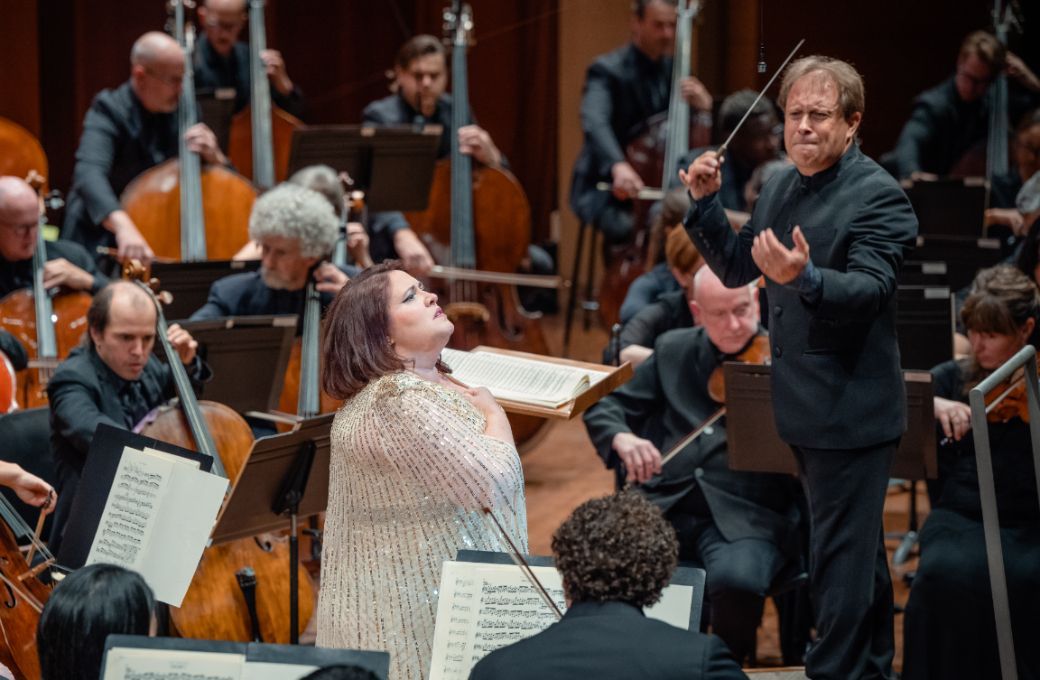Though it ended with the downfall of a whole civilization, the Seattle Symphony’s opening-night concert radiated the excitement of a brand new season just getting under way, with all its attendant fresh hopes.
The SSO happens to be among the oldest of American orchestras, having been founded 120 years ago. The opening programme paid homage both to that milestone birthday and to the silver anniversary of Benaroya Hall, the orchestra’s home. It combined works heard on the SSO’s very first concert in 1903 with big chunks from Götterdämmerung – excerpts from which the ensemble performed to inaugurate the new hall in 1998 under then Music Director Gerard Schwarz.
The SSO recently announced a four-year contract, its first since emerging from the pandemic crisis. But the musicians are heading into their second full season without the guidance of a Music Director, relying on a continually changing cast of visiting conductors. The new contract stipulates that the entire orchestra will have the power to vote on the candidates, though there’s been no hint yet of who will be chosen. Former Music Director Ludovic Morlot, who has been an especially frequent guest, conducted opening night, just as he had done a year ago.
Fully revived, the bond that developed between Morlot and the SSO over the past decade was as strong as ever, notwithstanding the fact that several new musicians have been appointed in recent years across the orchestra’s sections. But the conductor has moved on to a new chapter of his own as Music Director of the Barcelona Symphony Orchestra.
Morlot opened with a pair of rarities. Phèdre, an early concert overture from 1873 by Jules Massenet inspired by Racine’s tragedy, was on the bill of the first concert in 1903. Though performed with passion and sensitivity, its melodramatic postures felt overwrought, underscoring the difference in taste from early-20th-century audiences. I found the main point of interest to be Massenet’s refusal to allow a “happy ending” by staging a nearly violent swerve back into the minor key in the final measures.
A more satisfying selection from a later vintage of the SSO’s early years was interpolated into the “1903” half of the concert with Arthur Honegger’s Pastorale d’éte from 1920 (first played by the orchestra in 1929). Chamber-like in intimacy and atmosphere, this tender depiction of a Swiss summer dawn evoked more recent memories of the orchestra’s finesse under Morlot in French repertoire.

Morlot shaped Schubert’s “Unfinished” Symphony (also from the 1903 program) with classical restraint, while at the same time applying an almost impressionist subtlety of shading in dynamics and timbre. I was reminded of Eduard Hanslick’s observation (a propos the belated premiere) that Schubert’s “melodic stream” is “so lucid you can see every pebble on the bottom”. The Andante, well-proportioned and unsentimental, was particularly beautiful, the violins’ unaccompanied whispers ghostlike in their mystery.
Jeffrey Tate’s “suite” from Götterdämmerung filled the second half, tracing an arc from promising dawn in the Prologue’s second scene – such a contrast with the Honegger! – and Siegfried’s Rhine Journey to the Funeral March and Brünnhilde’s Immolation, the Ring cycle's grand finale. More’s the pity that witnesses to the SSO’s resplendent playing filled only about one-third of Benaroya Hall’s seats on opening night.
Morlot had only last month conducted many of the same musicians in Seattle Opera’s season-opening production, a stand-alone Das Rheingold, but his late Wagner sounded far more assured, dramatically taut while also luxuriant in detail. If her low range was frequently buried under the orchestral swell, soprano Alexandra LoBianco’s high notes thrilled with their power and warmth, and the introspective edge she gave Brünnhilde was particularly moving.


